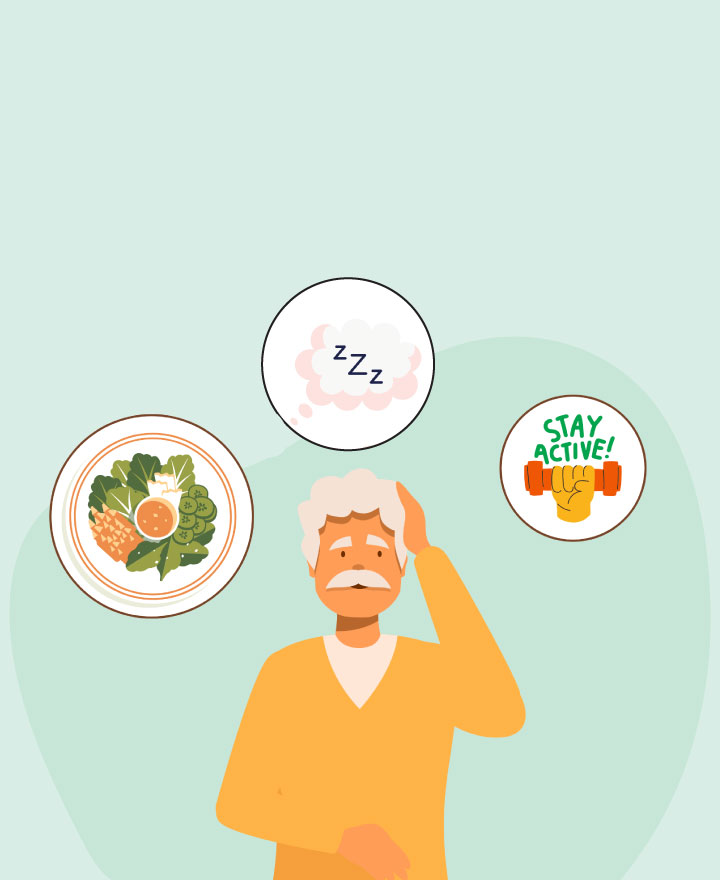

What to Know About Cognitive Decline in Older Adults
Cognitive decline is a seemingly prevalent issue, seen among elderly people around the globe. There are various ways to detect the issue of cognitive impairment in elderly and identify causes behind it. Also, adopting preventive measures to tackle it is widely available. Read on to know more.
What is a Cognitive Decline?
Cognitive impairment meaning states that it is a type of condition where an individual faces trouble to learn new stuff, remember things, keep concentration or take normal everyday life decisions. Cognitive decline develops with ageing, either suddenly or eventually having a temporary or a permanent effect. It is prevalent in elderly people and should be treated through proper medical care and attention.
Symptoms of Cognitive Decline in Older Adults
If you ageing, then chances to notice traits of forgetfulness in your daily behaviour is quite common. However, if you see this kind of an issue consistently then it can suggest the possibility of cognitive decline. There are some ways or symptoms that illustrate the possibility of cognitive impairment in elderly. Some common examples are:
● Consistently forgetting things in everyday life
● Failing to recall important social events or appointments
● Facing difficulties in navigating through familiar and amicable environments
● Feeling of being overwhelmed when faced with the situation of making choices
● Showing poor judgement frequently
Causes of Cognitive Decline in Older Adults
Some causes of cognitive impairment in elderly are:
1. Vitamin Deficiency
The deficit in levels of folate, vitamin B12 and other B vitamins can negatively affect the function of the brain.
2. Medications
Medicines like tranquillizers, anticholinergics, and sedatives can cause obstruction of general function of the brain.
3. Hormone Problem
Disparity within levels of estrogen and other sex hormones can have a negative effect on general cognitive function.
4. Delirium
Delirium is a condition that causes serious disruption of mental abilities resulting in reduced awareness and confused thinking. This is prevalent in the elderly which causes cognitive decline.
5. Injuries
Physical injuries to the head can give rise to a long-term or temporary cognitive decline.
6. Toxins
Toxins, like aim pollutants, pesticides, contaminated drinking water, heavy metals, etc., are yet another known cause of cognitive impairment in the elderly.
7. Bodily Affliction
Most elderly people face health issues like dysfunction of the liver or kidney, which can cause cognitive decline.
Some other common causes of cognitive impairment in elderly are Neurodegenerative Conditions, diabetes, high blood pressure, depression, shortfall of physical exercise, low level of education, etc.
How to Prevent Cognitive Decline in Older Adults?
Elderly people can engage in certain activities that can help to tackle the issue of cognitive decline and even enhance their learning capacity. They are:
1) Maintaining a Healthy Diet
2) Engage in Learning activities to stimulate and train your brain
3) Exercise regularly to keep your body fit and stay active
4) Maintain good quality sleep and get adequate rest
5) Socialise and communicate with people
Conclusion
While the problem of cognitive decline is an issue, there are ways which can help you detect it at an early stage to allow you to get appropriate help from professionals.
One of the important components of our overall wellness is also being financially secured. Healthcare emergencies can happen any time, but a good health insurance policy can protect you from such uncertain situations. To know more about Wellness and other health related tips, visit the Wellness Corner.
Sources: Webmd, Mayo Clinic, Harvard Health
Disclaimer: This blog provides general information and discussions about health and related subjects. The information and other content provided in this blog, website or in any linked materials are not intended and should not be considered, or used as a substitute for, medical advice, diagnosis or treatment. Kindly contact your Doctor before starting a new medicine or health regime.
Source: WHO, Mayo Clinic
Related Articles
Lifestyle Tips To Remain Healthy At An Older Age
Exercising Tips For Senior Citizen - Things To Do And To Avoid
Ways To Practice Mindfulness & Its Benefits For Healthier Ageing
Walking Is The Best Exercise For Elderly
Tips To Improve Nutrition In The Elderly
Published on October 18, 2022

















 Health Insurance
Health Insurance  Travel Insurance
Travel Insurance  Car Insurance
Car Insurance  Cyber Insurance
Cyber Insurance  Critical Illness Insurance
Critical Illness Insurance
 Pet Insurance
Pet Insurance
 Bike/Two Wheeler Insurance
Bike/Two Wheeler Insurance  Home Insurance
Home Insurance  Third Party Vehicle Ins.
Third Party Vehicle Ins.  Tractor Insurance
Tractor Insurance  Goods Carrying Vehicle Ins.
Goods Carrying Vehicle Ins.  Passenger Carrying Vehicle Ins.
Passenger Carrying Vehicle Ins.  Compulsory Personal Accident Insurance
Compulsory Personal Accident Insurance  Travel Insurance
Travel Insurance  Rural
Rural